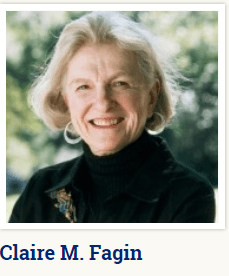The Check That Changed My Life
 I felt my body tremble as I was ushered into the office of Claire Fagin, the Dean of the School of Nursing of University of Pennsylvania I attended. It seemed like the office was the size of a football field. I eased into the chair opposite the dean’s desk and took a deep breath.
I felt my body tremble as I was ushered into the office of Claire Fagin, the Dean of the School of Nursing of University of Pennsylvania I attended. It seemed like the office was the size of a football field. I eased into the chair opposite the dean’s desk and took a deep breath.
“What can I do for you, Pat?”
“I came to ask for money. I’m broke.”
I was a 28-year-old graduate student who had an incredible professional opportunity to present at a conference and no resources to be able to take advantage of it.
My husband was fired from a well-paying job the week after I entered graduate school the year before. The firing took us completely off guard. I had quit my job to go to graduate school full time. My education was funded by government scholarships. Suddenly he had no job; I was in school full time and we had no income. We had a 2-year-old son.
As soon as I started graduate school, my husband started putting together funding to buy a welding business. For that entire year, while I was in school we lived off the money in our checking account. Week after week I watched our checking account steadily dwindle.
Invitation to Speak in Beverly Hills
“Would you come to California in June 1979 to present a paper at the American Diabetics Association conference?” The invitation I received in April 1979 took me by surprise. Part of my graduate program involved developing a plan to teach pregnant diabetics. My professor encouraged me to write an abstract for an upcoming meeting of the American Diabetes Association. I realized I did not fully understand what I was volunteering to do when my abstract was accepted and I received an invitation to make a presentation to the attendees of the American Diabetes Association conference in Beverly Hills. The conference was taking place a few weeks after I graduated in May 1979.
 We had $200 left when I graduated. How could I accept the offer? I had no money for a plane ticket, no money for a hotel, and no credit card. The timing was terrible, yet it was such an honor to be invited that I wanted to accept. I asked my professor, “What do I do? How can I fund this?” “Ask the dean of the school of nursing for money”, she advised me. “She loves to promote the school and improve its image. She would give you money.”
We had $200 left when I graduated. How could I accept the offer? I had no money for a plane ticket, no money for a hotel, and no credit card. The timing was terrible, yet it was such an honor to be invited that I wanted to accept. I asked my professor, “What do I do? How can I fund this?” “Ask the dean of the school of nursing for money”, she advised me. “She loves to promote the school and improve its image. She would give you money.”
My perception of the dean was that she was an aloof, imposing figure I had seen only from a distance. I was aware of her reputation as being forward thinking. Frankly, she intimidated me – how could I consider asking her for money? The week after I graduated with my master’s degree in nursing, I was going to start a job as a director of staff development in a large urban hospital. I called my boss to ask if the hospital would fund my trip to California to make this presentation. “We’ll let you have the time off to go even though you have not worked here long enough to be eligible for vacation time, but we won’t pay your expenses.”
Asking for Money
With no other choice, I made an appointment with Claire Fagin. She listened by my request. There was a small smile on her face. “I think your employer should pay your expenses”, she told me. “I tried that and found out they’d give me the time off but not pay for my airfare or hotel. Here’s what I can do. I will call guidance counselors and alumni of University of Pennsylvania who live in the Beverly Hills area. I will explain why I am at the conference and praise the educational opportunities at the school.”
The dean’s eyes started sparkling. “Yes, I think we can support that.” She arranged for me to get a print out of alumni in Los Angeles and said that when I prepared a report of my activities in California she would issue a check for $400.As I walked out of her office, I shook my head in wonder. “I just asked the dean of the University of Pennsylvania School of Nursing for money and she agreed!”
It was one of the biggest risks I had taken in my life. In order for me to walk into that office, I had to admit I needed help. That was not an easy step for me. My mother’s Irish English heritage dominated the values in our family. The British stiff upper lip philosophy did not encourage admitting to making mistakes or needing help. “Just deal with it. You’ll survive” was a more common message than “How can I help?”
I put the airfare on my husband’s credit card, arranged to sleep on a cot in a friend’s room, made phone calls to guidance counselors and alumni, and gave my presentation. I experienced a glow of satisfaction when the check for $400 arrived after I submitted my report of the phone calls I made in California.
I took a risk; it paid off. It was the first time I was rewarded for doing something that made me very uncomfortable. And it paved the way for more risk taking and eventually starting a business.
